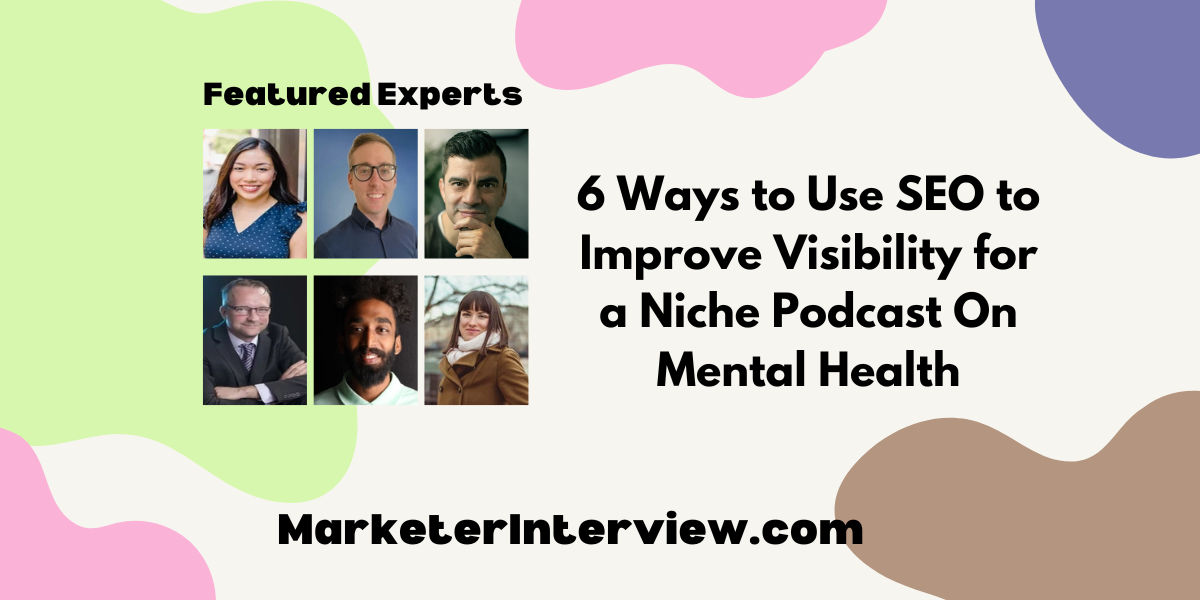6 Ways to Use SEO to Improve Visibility for a Niche Podcast On Mental Health
In the quest to enhance the online presence of a mental health-focused podcast, we’ve gathered six valuable insights from SEO experts and successful founders. From optimizing metadata for search engines to responding to journalist opportunities, discover the six strategies shared by these professionals to elevate your podcast’s visibility.
Want to get quoted in MarketerInterview.com content just like this? Apply to become a contributor today!
Contents
Optimize Metadata for Search Engines
To improve visibility for a niche podcast on mental health using SEO, my advice is to add relevant and accurate metadata to your podcast. This includes creating a compelling and descriptive title for each episode that incorporates targeted keywords related to your podcast’s themes. Write detailed show notes that include these keywords naturally. Don’t forget to tag episodes with appropriate categories and keywords. Accurate metadata ensures that search engines can effectively index your content, making it easier for your target audience to find your podcast.

Kristie Tse, Founder & Therapist, Uncover Mental Health Counseling
Use a Comprehensive SEO Checklist
Sharing one specific tip is, as always, hard to do when it comes to SEO; one always needs to understand the concepts. But here is a checklist I suggest you use:
- Name – This is more important than you might think. Include keywords related to “Mental Health” (or your specific niche) in the podcast name. People search for those keywords on the platform, so including them there is critical. The podcast platform also indexes your podcast, so it will show up in searches on Google; include your desired keywords there as well.
- Metadata – This is used for describing your podcast, and search engines use this (as does the platform) for understanding and categorizing your podcast. Use them wisely!
- Titles – Use your episode titles to target the keywords you are after.
- Episode Descriptions – Use this effectively as it describes your episode and its content. This is an exceptional opportunity to target the “low-hanging fruit” for your niche.
This will give you a steady and clear foundation for your podcast. If you don’t see quick results, don’t give up: they will come!

Magnus Strandberg, SEO Specialist, SEO Specialist Magnus Strandberg
Transcribe Episodes for SEO
Converting each podcast episode into a text transcript with relevant keywords and resource material can be a beneficial technique to improve the podcast’s visibility. The transcript can be published as a blog on your website, and the document link can be shared in the show notes of the relevant episode.

Tejas Dayananda Sagar, Head of Production, Spooler
Optimize Across Multiple Channels
To improve the SEO visibility of your mental health podcast, it’s best to optimize it for different channels, such as podcast platforms and your website, as many people search for podcasts on both search engines and podcast platforms.
To optimize it for podcast platforms, target long-tail keywords in your episode titles and descriptions. Aim for descriptive and concise titles. Encourage your listeners to give you positive reviews, as this increases the credibility of your podcast and attracts new listeners. Optimize your “About” section for relevant terms you’d like to be found for, and write an informative and engaging description of your podcast.
Site-wise, include full podcast transcripts and embed your podcast episodes on separate URLs, one URL per episode. Also, optimize the page as you would a regular page: add key terms you’d like to be found for in your URL, meta title, description, H1, and a few times in the text without being spammy.

Sonja Marinkovic, Founder, Leadin Therapy
Strategically Integrate Keywords
If you’re looking to improve the visibility of your niche podcast on mental health, leveraging SEO can make a significant difference. One specific technique is optimizing your podcast titles and descriptions with relevant keywords. Here’s how you can do it effectively:
- Start With Keyword Research – The first step is to understand what terms your potential listeners are searching for. Use tools like Google Keyword Planner, Ubersuggest, or AnswerThePublic to find keywords related to mental health that have good search volume but aren’t overly competitive. For instance, keywords like “mental health tips,” “overcoming anxiety,” or “mental wellness podcast” can be highly effective.
- Integrate Keywords Strategically – Once you have your keywords, integrate them naturally into your podcast titles and descriptions. For example, instead of a generic title like “Episode 10: Anxiety,” use a more descriptive, keyword-rich title like “Episode 10: Practical Tips for Overcoming Anxiety – A Mental Health Podcast.”
Similarly, in your description, provide a brief summary that incorporates your keywords while explaining the episode’s content. For example, “In this episode, we discuss practical tips for overcoming anxiety, featuring expert advice on mental wellness and strategies for managing anxiety in daily life.”
By optimizing your podcast titles and descriptions with well-researched keywords, you’ll make it easier for search engines to index your content and for potential listeners to find your podcast. Remember, the key is to be strategic yet natural with your keyword integration to maintain a conversational and engaging tone that resonates with your audience.
Harry Duran, CEO & Founder, FullCast
Respond to Journalist Opportunities
One effective technique for improving the visibility of a niche podcast on mental health through SEO is to actively respond to relevant journalist opportunities related to your niche. By leveraging platforms like Help a Reporter Out (HARO) and Qwoted, and subscribing to queries from journalists seeking expert insights on mental health topics, you can position yourself as an expert and gain valuable mentions in high-authority publications.
These mentions not only provide high-quality backlinks to your podcast, enhancing your SEO efforts, but also expose your podcast to a broader audience who might be interested in listening. This dual benefit of improving search engine rankings and attracting potential listeners through credible sources can significantly boost the visibility and credibility of your mental health podcast.

Darcy Cudmore, Founder, RepuLinks
Want to get quoted in MarketerInterview.com content just like this? Apply to become a contributor today!






